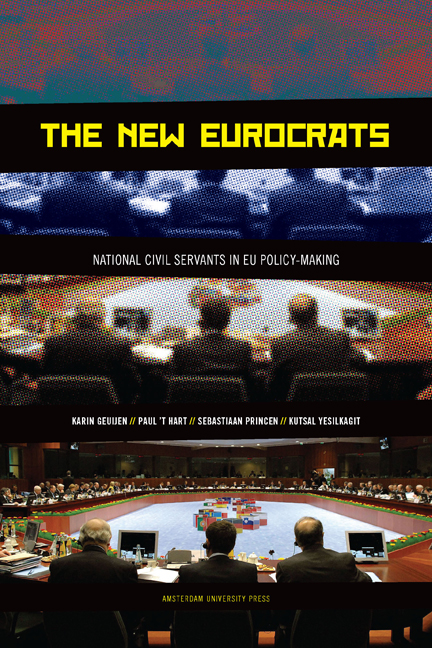Book contents
- Forntmatter
- Contents
- Tables and Figures
- Acknowledgements
- Chapter One Studying Eurocrats At Work
- Chapter Two Toward a Europeanised Civil Service? a Survey Study
- Chapter Three Eurocratic Work As Strategic Behaviour: Moving Before the Commission Does in Veterinary Policy
- Chapter Four Getting Things Done in European Police Co-Operation
- Chapter Five Bridge Builders Or Bridgeheads in Brussels? the World of Seconded National Experts
- Chapter Six Understanding Eurocratic Work: Conclusions and Reflections
- Appendix: Items on Europeansation Included in the ‘Pomo’ Survey
- Notes
- Bibliography
- About the authors
- Index
Chapter Six - Understanding Eurocratic Work: Conclusions and Reflections
Published online by Cambridge University Press: 15 January 2021
- Forntmatter
- Contents
- Tables and Figures
- Acknowledgements
- Chapter One Studying Eurocrats At Work
- Chapter Two Toward a Europeanised Civil Service? a Survey Study
- Chapter Three Eurocratic Work As Strategic Behaviour: Moving Before the Commission Does in Veterinary Policy
- Chapter Four Getting Things Done in European Police Co-Operation
- Chapter Five Bridge Builders Or Bridgeheads in Brussels? the World of Seconded National Experts
- Chapter Six Understanding Eurocratic Work: Conclusions and Reflections
- Appendix: Items on Europeansation Included in the ‘Pomo’ Survey
- Notes
- Bibliography
- About the authors
- Index
Summary
Dutch Eurocracy revisited
The research reported in this study was prompted by the widely perceived shift from ‘classic’ to ‘new’ diplomacy in the very design and day-to-day practices of international regimes such as the European Union. We set out to examine what implications the rise of policy-oriented, domain-specific bilateral, as well as multilateral, diplomacy (noted in chapter 1) has had on how nation-states organise their relations with their regional neighbours and the web of international organisations they belong to or are engaged in. By focusing on the case of the Netherlands and its modus operandi in the European Union, we wanted to document how its executive branch practices the art of ‘doing the government's business’ at the international level. Over half a century of deepening and widening European integration has clearly led to an increased involvement of hitherto ‘domestic’ ministries and officials, but how large has this shift been, and what forms has it actually taken? In particular, we sought answers to the following three research questions:
1. To what extent are Dutch civil servants involved in EU-related activities?
2. How do individual Dutch civil servants experience and practise the craft of policy-making for and in European arenas?
3. How and to what extent are these civil servants facilitated and constrained by existing ways of organising European affairs in their respective organisations?
Each of these questions was specified in a number of more specific issues (see chapter 1 and below). In this final chapter, we review the findings regarding each of these issues, which we gathered through a range of complementary research methods. We summarise the main findings of the preceding empirical chapters with regard to each of the main research questions. We will also try to integrate the findings from the two surveys and the two qualitative case studies to draw a number of overarching conclusions. And we will confront our empirical findings with the outcomes of the expert meetings that were held in the final stages of the fieldwork phase of the project. These expert meetings were meant to provide a sounding board for our observations, allowing us to better assess the extent to which they were shared by people working on EU-related matters within a wide range of organisations in central government.
- Type
- Chapter
- Information
- The New EurocratsNational Civil Servants in EU Policy-making, pp. 129 - 150Publisher: Amsterdam University PressPrint publication year: 2008



